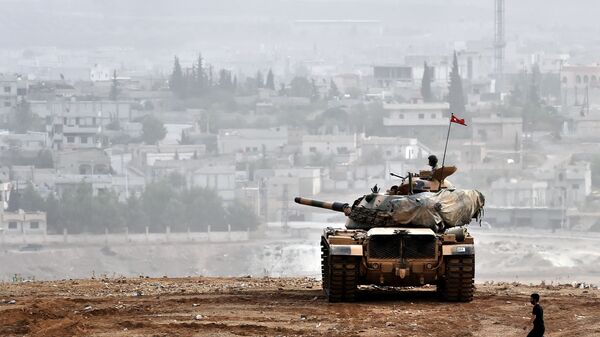"After the suicide attack in Gaziantep the Turkish government said that they will no longer tolerate the presence of Daesh on the border," the director of the Turkey Project at the Center for Strategic and International Studies in Washington, DC said. The Saturday attack on a Kurdish wedding claimed 54 lives and left 66 people wounded.
Turkish authorities have made similar statements before, but early on Wednesday, they moved beyond rhetoric and launched a major operation against Daesh in the Syrian town of Jarablus that involved intensive shelling and airstrikes. In addition, Turkish special forces and tanks crossed the border into Syria.
President Recep Tayyip Erdogan said that the operation was aimed at tackling both Daesh and the Kurds.
Turkish authorities have long said that the YPG is linked to the Kurdistan Workers' Party (PKK), a militant organization that has tried to secure greater autonomy, if not independence, for the Kurds living in Turkey. However, the US views the YPG and other Kurdish militias as one of the key forces in its campaign against Daesh.
"If Turkish artillery hit Manbij, it was hitting mostly Kurdish elements. So it hit both Daesh and the YPG. This of course created massive complications in Turkey's relationship with the US because the US has been backing the YPG against Daesh," the analyst said.

Turkey's strikes aimed against the Kurds have affected Washington's plans for the border area.
"Washington's hope was that after the capture of Manbij, the SDF would move to the town of al-Bab, which is further west, 20-30 kilometers away from the Turkish border and ultimately that these forces would move to Raqqa," the capital of Daesh's caliphate, he added.
The Kurdish issue is not the only one plaguing relations between the United States and Turkey.
Washington has been concerned with Ankara's improving relations with Moscow and Tehran. For its part, Turkish authorities have been discontent with the US response to the failed July 15 coup in Turkey and its apparent unwillingness to extradite reclusive Islamic cleric Fethullah Gülen, whom Erdogan blames for the putsch.
Bulent Aliriza noted that the US and Turkey are going through a "difficult period" in the bilateral relationship, adding that "they have not been on the same page with respect to Syria for some time now."




